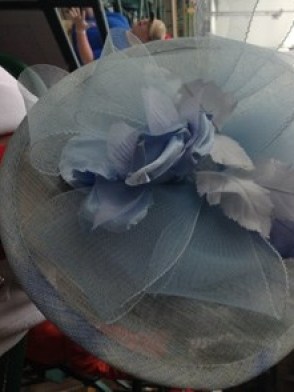 The first question everyone asked when they learned we were going to the Kentucky Derby this year was—“Do you have a hat?!” Yes, I did, and here’s the photo to prove it! It was like wearing a dinner plate on the side of my head.
The first question everyone asked when they learned we were going to the Kentucky Derby this year was—“Do you have a hat?!” Yes, I did, and here’s the photo to prove it! It was like wearing a dinner plate on the side of my head.
Unlike the unlucky folks who didn’t spring for under-cover seating, we were nice and dry, even though the May 5 race was the wettest Derby on record, by far. Our seats were great—right across from the winner’s circle and in full view of the finish line.
Given the television coverage, which we watch year after year, mint julep in hand, we were prepared for the elegant hats, the snazzy men’s suits, even Johnny Weir. But we were surprised Churchill Downs’s food options aren’t any better than those at our local AAA baseball team. Our Derby package came with a tent buffet (only so-so), and I pitied the patrons who had to depend on the track’s concession stands. Though we’d been warned off the premade mint juleps readily available, the one the bartender in the tent made from scratch was delicious.
The Derby itself—“the most exciting two minutes in sports”—was of course the pinnacle of the Louisville portion of our trip, but we saw lots of other sights in town, notably:
-

Art at the 21C Museum Hotel; photo: Vicki Weisfeld
The Louisville Slugger museum and a tour of the factory, which makes millions of baseball bats every year. Down Louisville’s Main Street are plaques in the sidewalk commemorating key ball players, along with life-sized replicas of the bats they used. And here I thought if you’ve seen one baseball bat, you’ve seen them all.
- A guided tour of the modern art collection at our downtown hotel, the 21C Museum Hotel (If you’re interested in modern art and don’t know about this small but growing boutique hotel chain, you’re really missing something!).
- The Zachary Taylor National Cemetery. The 12th president’s tomb was of peculiar interest to me, because recent genealogical research unearthed a photo of the gravestone of my three-greats grandmother, which says she was a descendant of President Taylor. A modicum of digging proved this to be more fake news.

Lexington horse farm; photo: Vicki Weisfeld
- The nearly 300-acre Cave Hill Cemetery, with its graves of Louisville founder George Rogers Clark, Muhammad Ali, Col. Sanders, Confederate and Union dead, and more than 100,000 other Louisville residents, famous and not-so.
- A bus tour that took us to Lexington and two horse farms, where we “met” the sire and grandsire of Derby winner “Justified” and saw lots of new foals. Also were briefed on racehorse breeding. “It’s not Barry Manilow and a glass of wine,” our guide said. No indeedy.
- A pleasant self-guided walking tour of Old Louisville, one of the country’s largest remaining Victorian neighborhoods.
Where we fell short was on the Urban Bourbon Trail. We visited only three of the 40 or so bourbontastic watering holes included in our passport, and even forgot have it stamped in one of them. On a five-day visit, that performance would have to be judged weak.
Reading on the Go
When you travel to Kentucky, here are some books you might take along.

Churchill Downs’s iconic twin spires; photo: Vicki Weisfeld









